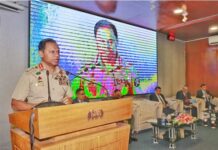By SYED ZAIN AL-MAHMOOD
DHAKA, Bangladesh—Protesters who have thronged the streets of Bangladesh’s capital for two weeks welcomed the government’s move to seek harsher punishments for war criminals, but vowed to continue agitating until the nation’s largest Islamist party is banned.
President Zillur Rahman on Monday signed a law that will allow prosecutors to appeal sentences handed down by a war-crimes tribunal that is investigating atrocities committed during the nation’s 1971 war of independence from Pakistan. Prosecutors will be allowed to retroactively seek the death penalty for convicts who were given lesser punishments. Earlier, the state could only appeal an acquittal.
Hundreds of thousands of civilians died in the 1971 conflict, many of them at the hands of Islamist militias that opposed splitting from Pakistan. Eight of the 10 suspects on trial at the tribunal, which was set up in 2010, are from Jamaat-e-Islami, Bangladesh’s largest Islamist party.
The government’s consideration of a ban on Jamaat-e-Islami will likely exacerbate the tensions between the country’s Islamists and secularists. Opposition parties say Ms. Hasina’s secular government is using the war-crimes tribunal to attack her political opponents. The new law gives the tribunal the power to try entire organizations for war crimes, which could allow Ms. Hasina’s government to push to effectively outlaw the Jamaat-e-Islami, as protesters have demanded.
Human-rights groups criticized the new law’s provisions allowing the state to target organizations for war crimes and retroactively appeal sentencing in war-tribunal cases as out of step with decades of international norms.
“It is highly unusual to declare someone a criminal based on his membership in an organization,” said Sam Zarifi, Asia director for the International Commission of Jurists, a Geneva-based legal advocacy group.
Thousands of protesters who had gathered at Shahbag square, a leafy boulevard in the center of Dhaka, erupted in cheers after the new law came into force. Many were outraged when the tribunal this month sentenced Abdul Quader Molla, a senior Jamaat-e-Islami leader, to life imprisonment. The government is expected to now press for Mr. Molla to get the death penalty, as the protesters have called for.
But protest organizers said they won’t be satisfied until the government cracks down more broadly on the Jamaat-e-Islami. “We want to see all of these men who opposed the formation of Bangladesh in 1971 be hanged,” said Asif Mohiuddin, an online activist who helped coordinate the massive protests. “We also want to see their party banned and their finances cut off.”
The unrest in the streets of Dhaka, the largest demonstrations in Bangladesh in two decades, has highlighted the deep rift in the mostly Muslim country between the secular Awami League party of Prime Minister Sheikh Hasina and the Islamist parties that are part of the opposition alliance.
The protests were beginning to thin out Monday, but thousands of demonstrators remained at the Shahbag site, waving flags and carrying banners with messages such as, “Hang them all or we won’t go home!”
“I didn’t see the 1971 [war], but I want a taste of it here,” said Amzad Hossain, a college student who traveled from a nearby district to join the protest.
The protests have worked to Ms. Hasina’s political advantage thus far, analysts say, creating a sense of urgency that has helped her fulfill a campaign promise to seek justice for 1971 war victims. The demonstrations have also shifted the nation’s attention from criticism by opposition parties that Ms. Hasina is creating roadblocks to fair elections.
Last year, Ms. Hasina scrapped a system under which a nonpartisan caretaker administration was going to oversee elections, leading to the opposition threatening a boycott of parliamentary polls due in early 2014. Ms. Hasina denies that she is obstructing fair elections.
Still, the continuing political unrest could damage an already fragile economy by discouraging investors. “The economy is under stress and investment will drop further if the situation is not resolved,” said Mirza Azizul Islam, a former adviser to the government.
The government said Sunday it was considering a ban on the Jamaat-e-Islami after it blamed the organization for killing a blogger who helped organize the protests. The blogger, 26-year-old Ahmed Rajib Haider, a self-professed atheist, was found hacked to death late Friday in front of his home, according to police.
Mahbubul Alam Hanif, a leader of the ruling Awami League, said Monday the new law has laid the groundwork for banning the Jamaat-e-Islami. “Parties who practice violence don’t deserve to be in politics,” he said.
The Jamaat-e-Islami has denied involvement in Mr. Haider’s death and said Ms. Hasina is turning the tribunal into a weapon to attack her political opponents.”The main aim of this drama is to ban the Jamaat-e-Islami on grounds of popular demand,” said Shafiqul Islam Masud, a leader of the party.
A dawn-to-dusk general strike called Monday by the Jamaat-e-Islami to protest what it sees as targeting of its activists by police ended with sporadic violence. In Comilla, 50 miles, or 80 kilometers, southeast of Dhaka, a Jamaat-e-Islami activist was shot dead after clashes with police, the local police chief said. In Dhaka, one man was killed after a bus overturned as it tried to escape stone-throwing picketers.
Police have denied charges that officers are using excessive force against antigovernment activists.
Source: WSJ









